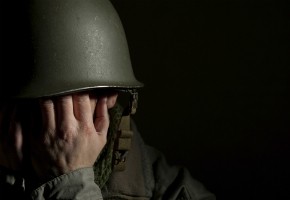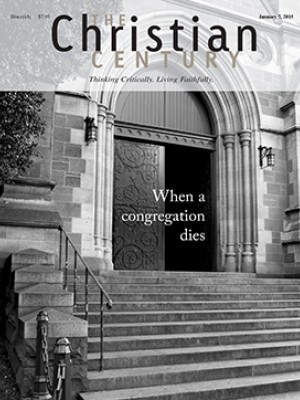The war within: A veterans moral injury

I served in the army from 2002 through 2006 as an explosive ordnance disposal specialist, including six months in Iraq. Recently, a soldier from my old unit, who had been deployed multiple times to Iraq and Afghanistan, was in Texas, where I am studying at a seminary. Eager to see him after nine years, I drove down to San Antonio and met him at a shopping mall food court. We chatted about our new lives, our routines, our hobbies. At one point he said: “I haven’t slept much since the wars started.”
I also didn’t sleep much when I returned from Iraq. I could not sleep because I was disturbed—disturbed by the war and by my attempt to reenter a consumer-driven civilian life. I was bothered by a feeling I could not quite identify that I suspect keeps many from sleeping. “Moral injury” is a name for it.
Read our latest issue or browse back issues.
For me, moral injury describes my disillusionment, the erosion of my sense of place in the world. The spiritual and emotional foundations of the world disappeared and made it impossible for me to sleep the sleep of the just. Even though I was part of a war that was much bigger than me, I still feel personally responsible for its consequences. I have a feeling of intense betrayal, and the betrayer and betrayed are the same person: my very self.
Calling my experience “disillusionment” does not describe how I feel about those with whom I shared military service. Nor have I become disillusioned with the ability and dedication of the U.S. military to meet specifically identified objectives.
What began to erode for me in Iraq in 2004 was my perception of good and evil. What I lost was a world that makes moral sense.
One of my favorite movies illustrates this loss. A Man for All Seasons is a romanticized story about Thomas More, a friend of King Henry VIII and chancellor of the realm. At one point More is urged to arrest one of his enemies, but More refuses, because the man has broken no law. More’s soon-to-be son-in-law, William Roper, asks, “So now you give the Devil the benefit of the law?”
More replies, “Yes! What would you do? Cut a great road through the law to get after the Devil?”
Roper, with all the certainty of youth, exclaims, “Yes, I’d cut down every law in England to do that!”
More responds:
Oh? And when the last law was down, and the Devil turned ’round on you, where would you hide, Roper, the laws all being flat? This country is planted thick with laws, from coast to coast, Humanity’s laws, not God’s! And if you cut them down, and you’re just the man to do it, do you really think you could stand upright in the winds that would blow then? Yes, I’d give the Devil benefit of law, for my own safety’s sake!
This is what moral injury is—the winds that blow when all the laws, all the understood ways of relating to other human beings have been laid flat. For when we release the terms good and evil and start applying those terms to human beings and whole groups of people, we allow ourselves the capacity to lay flat any moral qualms in order to pursue the enemy to the ends of the earth.
I was 19 when I left for war. I did not know I was leaving a world that made sense—a world where people respected one another’s lives and dignity, a world where violence and murder were understood to be wrong and punished by laws—and entering a world where all bets were off. I was a willing participant in this war.
For the sake of pursuit of the enemy, we started to ignore things that would not have been acceptable to me in other circumstances: noncombatants being pulled from their homes in the dead of night, with black bags placed over their heads; people dragged to a prison compound and kept there with no avenue for recourse or appeal, no law of any kind determining how long they could be kept or for what reason. Wartime violence was no longer a bad thing: it is sought after as a quality of character.
Such a monumental shift in one’s perception of the world, however, cannot be temporary. I expected to be able to return to the solid foundations of the world I had left, with its understandings of moral truth. But when I arrived home, I could not. Everything was laid flat. I returned, like so many others, to sleepless nights and to the thoughts and memories of war. There is no moral shelter when all is laid flat.
Can we heal from that? I am not sure. I sleep well nowadays. In part, this is simply because of the space and time between me and the experiences of the war. I have become adept at avoiding thinking about it. For moral injury is more like a chronic illness than an acute one. It is something like the pain of arthritis or an old, bad knee that someone complains about when it rains.
The pain manifests itself in strange ways. I have experienced spontaneous tears of rage while driving to the grocery store that seem to bubble up from nowhere. Sometimes I cannot look a family member in the eye after she has thanked me for my service. Sometimes when I see the children in the youth group with which I work, who are surrounded by loving parents and church members, who anticipate lives of opportunity, my mind wanders to the streets of Baghdad and to the children who asked me for candy, who grew up in the midst of war.
I know that plenty of civilians feel terrible about U.S. involvement in Iraq and Afghanistan. But as a veteran, I cannot quite clearly distinguish the war as something “out there” or in the past—it is like something I own personally. It lives in me. Sometimes I feel condemned not only by my own actions, but by the war as a whole. I do not mean condemned by some cosmic force or condemned by society. I mean that I condemn myself.
This is a paradox. Of course the war is a part of me. I cannot avoid it. I cannot escape my experience. And yet who I am rejects what war is—and what I was in the war.
I categorically reject the unleashing of “good” and “evil” as fundamental ways of understanding human beings, the notion that we can place ourselves on a moral high ground and, having done so, completely disregard any moral obligation to avoid violence and death-dealing. I reject the notion that the value of life can be laid flat to be reclaimed later.
Once war is over, what remains? Who or what will stop those winds from blowing?





